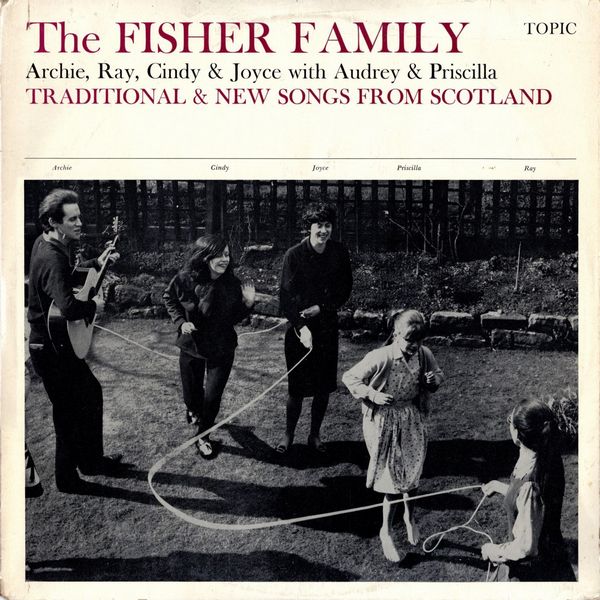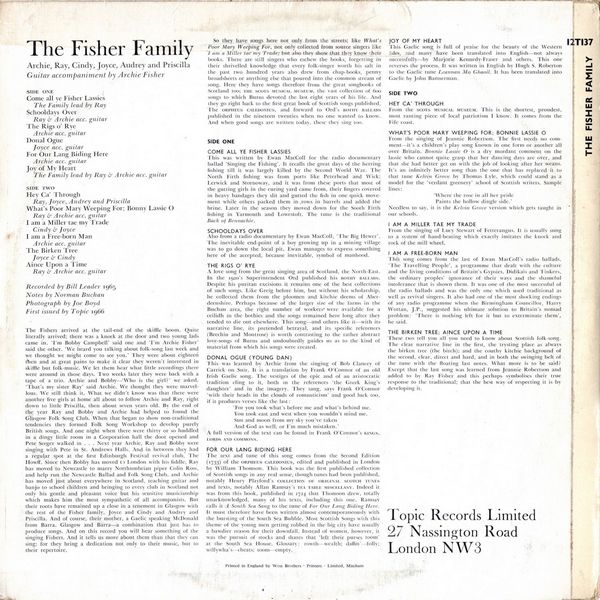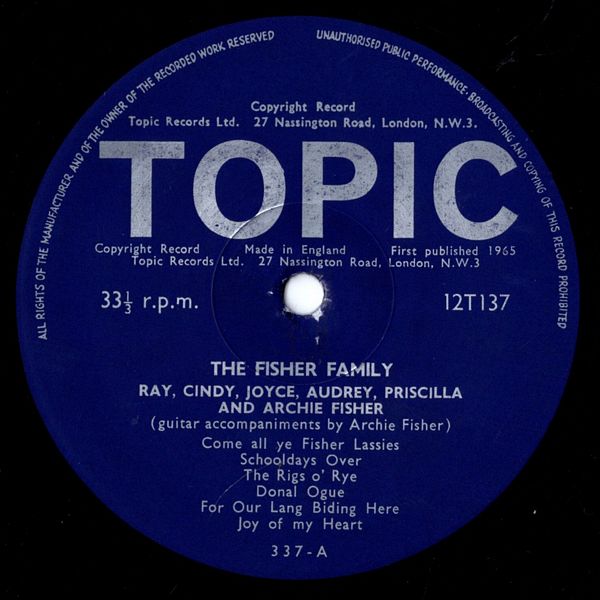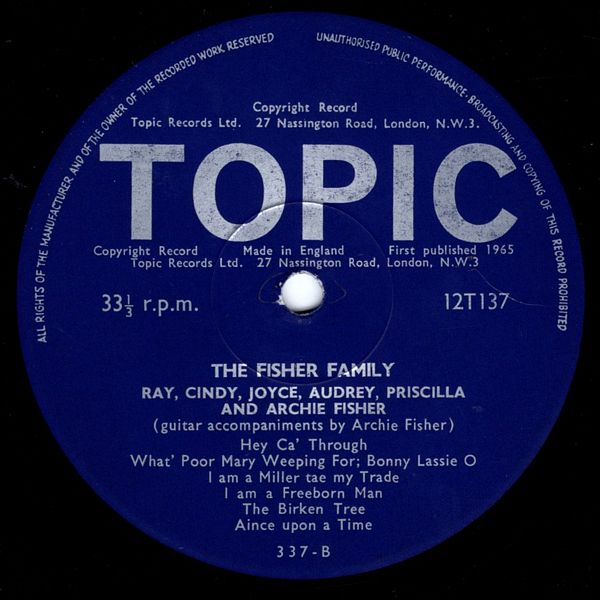
 |



|
Sleeve Notes
The Fishers arrived at the tail-end of the skiffle boom. Quite literally arrived; there was a knock at the door and two young lads came in. 'I'm Bobby Campbell' said one and 'I'm Archie Fisher' said the other. 'We heard you talking about folk-song last week and we thought we might come to see you.' They were about eighteen then and at great pains to make it clear they weren't interested in skiffle but folk-music. We let them hear what little recordings there were around in those days. Two weeks later they were back with a tape of a trio. Archie and Bobby — 'Who is the girl?' we asked. 'That's my sister Ray' said Archie. We thought they were marvellous. We still think it. What we didn't know was that there were another five girls at home all about to follow Archie and Ray, right down to little Priscilla, then about seven years old. By the end of the year Ray and Bobby and Archie had helped to found the Glasgow Folk Song Club. When that began to show non-traditional tendencies they formed Folk Song Workshop to develop purely British songs. And one night when there were thirty or so huddled in a dingy little room in a Corporation hall the door opened and Pete Seeger walked in … Next year Archie, Ray and Bobby were singing with Pete in St. Andrews Halls. And in between they had a regular spot at the first Edinburgh Festival revival club. The Howff. Since then Bobby has moved t> London with his fiddle, Ray has moved to Newcastle to marry Northumbrian piper Colin Ross, and help run the Newcastle Ballad and Folk Song Club, and Archie has moved just about everywhere in Scotland, teaching guitar and banjo to school children and bringing to every club in Scotland not only his gentle and pleasant voice but his sensitive musicianship which makes him the most sympathetic of all accompanists. But their roots have remained up a close in a tenement in Glasgow with the rest of the Fisher family, Joyce and Cindy and Audrey and Priscilla. And of course, their mother, a Gaelic speaking McDonald from Barra. Glasgow and Barra — a combination that just has to produce songs. And on this record you will hear something of the singing Fishers. And it tells us more about them than that they can sing; for they bring a dedication not only to their music, but to their repertoire.
So they have songs here not only from the streets; like What's Poor Mary Weeping For, not only collected from source singers like 1 am a Miller tae my Trad; but also they show that they know their books. There are still singers who eschew the books, forgetting in their shrivelled knowledge that every folk-singer worth his salt in the past two hundred years also drew from chap-books, penny broadsheets or anything else that poured into the common stream of song. Here they have songs therefore from the great songbooks of Scotland too; the scots musical museum, the vast collection of 600 songs to which Burns devoted the last eight years of his life. And they go right back to the first great book of Scottish songs published, The orpheus caledonius, and forward to Ord's bothy ballads published in the nineteen twenties when no one wanted to know. And when good songs are written today, these they sing too.
Come All Ye Fisher Lassies — This was written by Ewan MacColl for the radio documentary ballad 'Singing the Fishing'. It recalls the great days of the herring fishing till it was largely killed by the Second World War. The North Firth fishing was from ports like Peterhead and Wick; Lerwick and Stornoway, and it was from these ports that most of the gutting girls in the curing yard came from, their fingers covered in heavy bandages they slit and gutted the fish in one quick movement while others packed them in rows in barrels and added the brine. Later in the season they moved down for the Sooth Firth fishing in Yarmouth and Lowestoft. The tune is the traditional Back of Bennachie.
Schooldays Over — Also from a radio documentary by Ewan MacColl, 'The Big Hewer'. The inevitable end-point of a boy growing up in a mining village was to go down the local pit. Ewan manages to express something here of the accepted, because inevitable, symbol of manhood.
The Rigs O' Rye — A love song from the great singing area of Scotland, the North-East. In the 192o's Superintendent Ord published his bothy ballads. Despite his puritan excisions it remains one of the best collections of such songs. Like Greig before him, but without his scholarship, he collected them from the ploomen and kitchie deems of Aberdeenshire. Perhaps because of the larger size of the farms in the Buchan area, the right number of workers were available for a ceilidh in the bothies and the songs remained here long after they tended to die out elsewhere. This song — and others like it — with its narrative line, its pretended betrayal, and its specific references (Brechin and Montrose) is worth contrasting to the rather abstract love-songs of Burns and undoubtedly guides us as to the kind of material from which his songs were created.
Donal Ogue (Young Dan) — This was learned by Archie from the singing of Bob Clancey of Carrick on Suir. It is a translation by Frank O'Connor of an old Irish Gaelic song. The vestiges of the epic and of an aristocratic tradition cling to it, both in the references 'the Greek King's daughter' and in the imagery. They sang, says Frank O'Connor 'with their heads in the clouds of romanticism' and good luck too, if it produces verses like the last:
'For you took what's before me and what's behind me.
You took east and west when you wouldn't mind me.
Sun and moon from my sky you've taken And God as well, or I'm much mistaken.'
A full version of the text can be found in Frank O'Connor's KINGS, LORDS AND COMMONS.
For Our Lang Biding Here — The text and tune of this song comes from the Second Edition (1733) of the orpheus caledonius, edited and published in London by William Thomson. This book was the first published collection of Scottish songs in any real sense, though tunes had been published, notably Henry Playford's collection of original scotch tunes and texts, notably Allan Ramsay's tea table miscellany. Indeed it was from this book, published in 1724 that Thomson drew, totally unacknowledged, many of his texts, including this one. Ramsay calls it A South Sea Sang to the tune of For Our Lang Biding Here. It must therefore have been written almost contemporaneously with the bursting of the South Sea Bubble. Most Scottish Songs with this theme of the young men getting robbed in the big city have usually a bawdier reason for their downfall. Instead of women, however, it was the pursuit of stocks and shares that 'left their purses toom' at the South Sea House. Glossary: rowth — wealth; daffin' — folly; willywha's — cheats; toom — empty.
Joy Of My Heart — This Gaelic song is full of praise for the beauty of the Western Isles, and many have been translated into English — not always successfully — by Marjorie Kennedy-Frascr and others. This one reverses the process. It was written in English by Hugh S. Roberton to the Gaelic tune Leannan Mo Ghaoil. It has been translated into Gaelic by John Bannerman.
Hey Ca' Through — From the scots musical museum. This is the shortest, proudest, most ranting piece of local patriotism I know. It comes from the Fife coast.
What's Poor Mary Weeping For; Bonnie Lassie O — From the singing of Jeannie Robertson. The first needs no comment — it's a children's play song known in one form or another all over Britain. Bonnie Lassie O is a dry mordant comment on the lassie who cannot quite grasp that her dancing days are over, and that she had better get on with the job of looking after her weans. It's an infinitely better song than the one that has replaced it to that tunc Kelvin Grove by Thomas Lyle, which could stand as a model for the 'verdant greenery' school of Scottish writers. Sample lines:
'Where the rose in all her pride
Paints the hollow dingle side.'
Needless to say, it is the Kelvin Grove version which gets taught in our schools.
I Am A Miller Tae My Trade — From the singing of Lucy Stewart of Fetterangus. It is usually sung to a system of hand-beating which exactly imitates the knock and rock of the mill wheel.
I Am A Free-Born Man — T his song comes from the last of Ewan MacColl's radio ballads, 'The Travelling People', a programme that dealt with the culture and the living conditions of Britain's Gypsies, Didikais and Tinkers, the ordinary peoples' ignorance of their ways and the shameful intolerance that is shown them. It was one of the most successful of the radio ballads and was the only one which used traditional as well as revival singers. It also had one of the most shocking endings of any radio programme when the Birmingham Councillor, Harry Wottan, J.P., suggested his ultimate solution to Britain's nomad problem: 'There is nothing left for it but to exterminate them', he said.
The Birken Tree; Aince Upon A Time — These two tell you all you need to know about Scottish folk-song. The clear narrative line in the first, the trysting place as always the birken tree (the birch); and the couthy kitchie background of the second, clear, direct and hard, and in both the swinging belt of the tune with the floating last notes. What more is to be said? Except that the last song was learned from Jeannie Robertson and added to by Ray Fisher and this perhaps symbolises their true response to the traditional; that the best way of respecting it is by developing it.